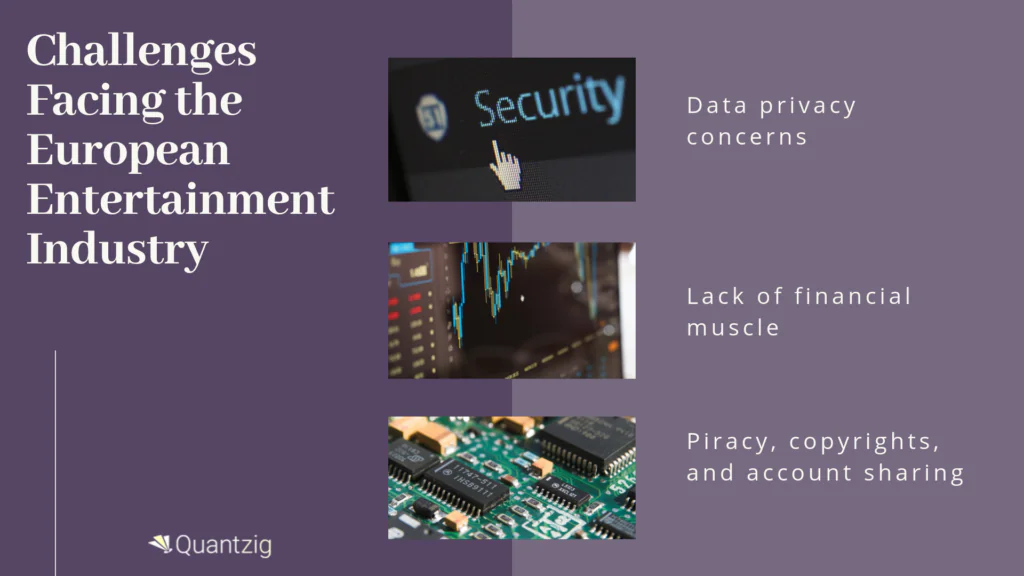The European entertainment industry is growing at an unprecedented rate, and several companies are finding it difficult to keep up with the pace. Challenges facing entertainment industry arise due to the growing pressures to keep the costs down while trying to improve revenues and the highly fragmented media consumption habits of customers. The trend of one big company dominating the market is gradually fading away, providing an opportunity for small players to complete successfully. One of the most significant trends observed in the media and entertainment industry is the shift in media platforms from traditional channels to online mediums. As a result, it paves the way for the European entertainment industry to implement big data analytics technology to gain more profound audience insights.
With new sources of data available to the media and entertainment companies every day, they can efficiently understand customer needs and deliver the right content to address the needs of the audience. However, with the rapid adoption of digital technologies, this industry is poised to face critical challenges that may slow down their progression. In this article, we have listed major challenges facing the European entertainment industry, a knowledge of which can help media and entertainment companies to adopt a smart approach and stay ahead of the curve.
Table of Contents
Challenges in the European Entertainment Industry
Data Privacy Concerns
Today consumers are being more sensitive towards their data and are concerned about how their data is being used. Additionally, policymakers have also addressed their issues and have implemented regulations for businesses that handle personal data. Such challenges can pose problems when it comes to accumulating sufficient user data, without which accurate analysis cannot be performed.
Book a demo to experience the meaningful insights we derive from data through our analytical tools and platform capabilities. Schedule a demo today!
Request a free demo
Lack of Financial Muscle
One of the most significant challenges in this industry is the lack of financial muscle for media start-ups and SMEs. While accounting for cost factors to implement data analytics, companies in the European market need to look at various factors including data storage costs, infrastructure costs, data processing costs, and human resource costs. Although it is easy to start a new company producing content, games, or apps, it can be tough to scale up without significant investments. Thankfully, the advent of cloud storage and SaaS solutions have provided a way out for start-ups and SMEs.
Shifting Consumer Preferences and Audience Tastes
In the dynamic landscape of the entertainment industry, one prominent challenge is the constant evolution of consumer preferences and audience tastes. Brands in this sector must be attuned to rapidly changing trends, ensuring that their content resonates with diverse demographics. This challenge involves staying ahead of the curve, predicting the next big thing in genres, themes, and storytelling formats. Failure to adapt to emerging tastes may result in a decline in viewership and diminished success for projects. Content curators and supply-chain players play pivotal roles in deciphering audience expectations, making it essential for the brands to collaborate closely with them to produce content that captivates and engages the target audience.
Ethical Dilemmas and Unethical Practices
The entertainment industry grapples with ethical dilemmas and potential unethical practices that can harm a brand’s reputation. As the industry embraces new business models, such as streaming services and digital platforms, navigating ethical considerations becomes more complex. Brands must exercise due diligence in partnering with production companies, special effects firms, and other stakeholders to ensure ethical practices throughout the content creation process. Unethical behavior, ranging from labor disputes and production delays to financial losses and legal non-compliance, can tarnish a brand’s image, making it crucial for companies to prioritize integrity and transparency in their operations.
Experience the advantages firsthand by testing a customized complimentary pilot designed to address your specific requirements. Pilot studies are non-committal in nature.
Request a free pilotPiracy, Copyrights, and Account Sharing
Piracy and copyright issues have been a major area of concern in the media and entertainment industry for a long time. However, the advent of the digital medium has created a new challenge of account sharing. For the majority of video streaming sites, a large number of people gain access by sharing account information and passwords. Analysts will have a tough time performing analysis on customer preferences as they cannot pinpoint the demographic details of the user. Both the child and the adult may be using the same account, so an effective judgment is impossible on whether the child or the adult prefers a specific genre.
Global Expansion and Cultural Sensitivity
As companies seek to expand their reach into different markets and cater to unique cultures, they face challenges related to global expansion and cultural sensitivity. Language barriers, differing legal and regulatory compliances, and cultural nuances require careful navigation. The brands must develop strategies to overcome these challenges, collaborating with film industry professionals who understand the intricacies of various markets. Successfully navigating these challenges involves tailoring content to resonate with diverse audiences while respecting cultural differences. Failing to address these issues adequately may lead to misinterpretation, backlash, and potential damage to a brand’s reputation in international markets.
Get started with your complimentary trial today and delve into our platform without any obligations. Explore our wide range of customized, consumption driven analytical solutions services built across the analytical maturity levels.
Start your free trialWhat are the appropriate solutions to the challenges facing the entertainment sector in the digital age?
Solution 1: Holistic Risk Management and Crisis Preparedness
In the dynamic landscape of the entertainment industry, a comprehensive risk management strategy is imperative to mitigate negative impacts on reputation, finances, and operations. To address challenges like negative press, declining sales, and cyber threats, companies should invest in robust crisis preparedness programs. This involves establishing communication protocols to manage negative publicity promptly, implementing cybersecurity measures to safeguard sensitive data, and creating emergency response plans for mass casualty events.
Furthermore, addressing talent risk and ensuring safe work environments are crucial components. Cast insurance, well-defined evacuation plans, and security presence during events contribute to both employee safety and overall risk reduction. Additionally, industry players should conduct due diligence when choosing partners, be it in production, special effects, or distribution, to avoid unethical practices and budget overruns. By adopting a proactive approach to risk management, the entertainment sector can better navigate the challenges facing entertainment industry posed by negative press, cyber threats, and emergencies, fostering resilience in the digital age.
Solution 2: Adaptation to Changing Audience Preferences and Technological Advances
To counter declining viewership and changing audience tastes, companies must adapt to evolving trends and leverage technological advancements. This involves embracing user-friendly production software and staying abreast of content creation tools. Understanding social trends and audience preferences is vital for crafting engaging plots, character developments, and visual spectacles.
In response to the rise of streaming services and the abundance of content, businesses should explore new business models, such as subscription-based or ad-supported platforms. Leveraging cloud computing can enhance scalability and flexibility in content distribution, addressing challenges in supply-chain logistics and reducing production delays. By consistently delivering high-quality, innovative content that aligns with current trends and technological capabilities, the industry can retain and attract audiences in the digital era.
Solution 3: Ethical Business Practices and Industry Collaboration
To maintain brand reputation and counteract the impact of unethical practices, entertainment companies should prioritize transparency, adherence to legal and regulatory compliances, and ethical conduct throughout the production process. This includes establishing partnerships with reputable and experienced players in different markets, acknowledging language barriers and unique cultures.
Collaboration within the industry, including addressing labor disputes and ensuring fair compensation, is crucial for sustainable growth. Developing and adhering to industry-wide standards for production companies, special effects companies, and content curators can foster a culture of trust and accountability. By collectively promoting ethical business practices and fostering collaboration, the entertainment sector can enhance its credibility and strengthen its position in the digital age.
Solution 4: Diversification and Innovation in Content Creation
To combat the challenges of uninspired content choices and declining interest in traditional cinema, companies should focus on diversifying content offerings and embracing innovative storytelling formats. This involves exploring original blockbusters, creating content tailored for younger audiences, and building emotional connections through well-established backstories.
The adoption of different business models, such as ad-supported or subscription-based streaming, allows for experimentation with content delivery methods. Investing in captivating protagonists, crafty executions, and cutting-edge visual effects enhances the overall appeal of projects, counteracting the decline in viewership. By continuously pushing the boundaries of creativity, embracing new storytelling techniques, and meeting the demands of diverse audience segments, the entertainment sector can thrive amidst the challenges of the digital age.
Conclusion
In conclusion, the entertainment industry face a myriad of challenges, from shifting consumer preferences and audience tastes to ethical dilemmas, global expansion, and cultural sensitivity. Navigating these complexities requires a delicate balance between staying attuned to trends, exercising due diligence, and fostering cultural understanding. Adapting to technological advancements, embracing diverse business models, and ensuring transparency in partnerships are paramount. As the industry grapples with challenges like unethical practices and the dynamic landscape of audience expectations, successful brands prioritize integrity, collaboration with supply-chain players, and global strategies. By addressing these multifaceted issues, brands can position themselves for sustained success in an ever-evolving business landscape.



